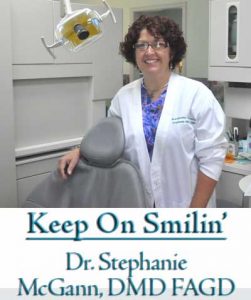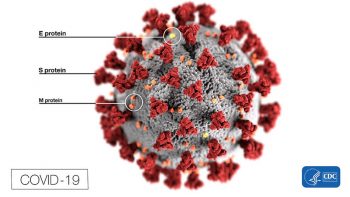By Dr. Stephanie McGann, DMD FAGD, Columnist, The Times
 Today I sent a communication to my patients, explaining what should be, for most, common sense. I advised my patients that if they have a cough, a fever, respiratory symptoms or shortness of breath that they should reschedule their dental appointment.
Today I sent a communication to my patients, explaining what should be, for most, common sense. I advised my patients that if they have a cough, a fever, respiratory symptoms or shortness of breath that they should reschedule their dental appointment.
Why? All I needed to do was to take a look around, in my small waiting area were two elderly patients, and a young mother with a newborn. It’s clear that those who are not at risk need to be aware that they are surrounded by those who are. Not everyone is young and healthy. While the risk of serious disease outcomes for a healthy young person is miniscule, I don’t think it’s prudent to expose those who are at risk. While common sense says to stay home if you are sick, I cannot count how many times a sick individual home from work or school dragged themselves to the dentist, because they were “already home.”
A public health problem is everyone’s concern. One individual’s decision to potentially expose others can have far reaching effects. I have heard that folks are blaming the media for “over hyping the seriousness of this disease.” It’s a double-edged sword.The media’s coverage has folks zealously washing their hands and avoiding cramped spaces with other people. That exceptional response will have a positive impact on the overall impact of Corona. If the media downplayed the disease and people ignored quarantine and went to work or school coughing and feverish, we could well have a much larger problem on our hands. So, do not blame the media. They are doing their part.
Rules to follow:
If you need to cough or sneeze – do so into your elbow or sleeve, not a hand or something that will touch your face or another surface. Wash your hands regularly and be cautious of touching things that are community in nature. This includes door knobs, shopping carts and public restrooms. When you do encounter these items it’s a good time for the hand sanitizer or good old soap and water.
Social distancing – that’s what it’s called when you put a little more space between you and other people. This is the theory behind avoiding crowded places with folks that may be contagious. It doesn’t mean lock yourself at home, it does mean that perhaps shaking hands with every new person you meet might not be a good plan. Germaphobes for years have avoided this practice and replaced it with some other form of greeting. Social distancing is why some schools are going to more online learning and playing sporting matches without spectators. If you are in the high risk group, elderly, have a compromised immune system (post chemo, taking steroids, etc) or have other factors such as lung disorders such as Asthma or COPD to name a few, then staying out of crowded public places is a good precaution. For average healthy people, the biggest risk factor is how your life would be impacted by 14 or more days of quarantine? People in quarantine are not released until they clear the virus, for some this is longer than two weeks. Who would do what you do? Would your job still be there? Can you afford to skip two or more weeks of pay?
The real impact of Covid – 19:
Economic. Pure and simple. This will affect everyone. Parents, facing school and day care closures are scrambling for child care options. Employers with businesses who are impacted by fewer customers due to the virus are laying off workers. Others are rapidly implementing online work from home options for more employees than ever. Manufacturers are finding shortages of parts to fill orders and shipments of needed materials from China have been halted. Movie theaters, restaurants, concerts, sporting events and all in-person entertainment will suffer.
We are already seeing concerns on college campuses, nursing facilities and daycare. The recommendation to avoid cruise ships doesn’t just affect the bottom line of the cruise line, it affects the individual employees, the dock worker, the businesses that supply the food and materials for the voyages just to name a few. The current toilet paper shortage shows just how much people want to do something to prepare. The hospitality industry is in trouble as people are forgoing travel plans. Health care workers are having their masks rationed because so many of those items were made in China. There is a shortage of protective gear for medical professionals. Just look at Wall Street and you can already see that there is a global fiscal impact.
The fear. In most other health crises medical professionals could turn to the Centers for Disease Control (CDC) for advice on how best to handle each situation. The CDC was once known for the best minds in this field. The tremendous work by folks at the CDC are why SARS, Ebola, H1N1, and many more threats are contained, controlled and, to be honest, never cross our minds. That leadership is not there now. Every piece of information the CDC is putting out must first go through the political filter of our current administration.
The CDC cannot release information to anyone but Vice President Mike Pence, appointed by President Donald Trump to lead the federal Coronavirus task force. Many of the best and brightest are no longer part of the solution. As a trained medical professional the “gag-order” on the CDC and politicizing a public health crisis is horrifying. Medical professionals who specialize in epidemic and pandemic outbreaks should be allowed to use their knowledge, expertise and do their jobs. Without reliable information from the CDC fear and panic prevail. This is just one reason why state and local public health officials are losing a lot of sleep over this one. One only has to compare the number of confirmed cases listed by individual state health departments to that of the federal numbers to see that we have a systematic wide reaching information problem.
While Coronavirus (COVID-19) has been spreading, it is only now, months later that commercial labs in Pennsylvania have any access to the test. We still don’t have a mass produced quick test to screen for the virus. In some other countries – Canada specifically — they will bring the test to where someone is self isolating, not have them go to a crowded doctor office or hospital to have the test ordered, then possibly a trip to the lab. My office staff listens to Internet radio and recently we have been enjoying a station from Alberta, Canada. The Canadian national health service makes it very clear exactly how a potentially exposed person is to call a toll free number and the testing service will come to them. Why are we here in the US so far behind the curve on this?
So what do we do now? Use personal hygiene precautions. Don’t over react. If a member of the family is sick, try to keep it from spreading. Do not hoard masks or toilet paper. Many people will contract corona yet never be aware that they had anything more serious than the common cold. Some may have no symptoms at all. Others in high risk groups may get a very serious, life-threatening pneumonia. Be aware that anyone can be contagious without symptoms, so always keep up the hand washing. Individuals who are at risk for serious complications from Corona should stay out of crowded places.
Be smart but don’t panic. This is NOT a zombie apocalypse, but it is serious.





